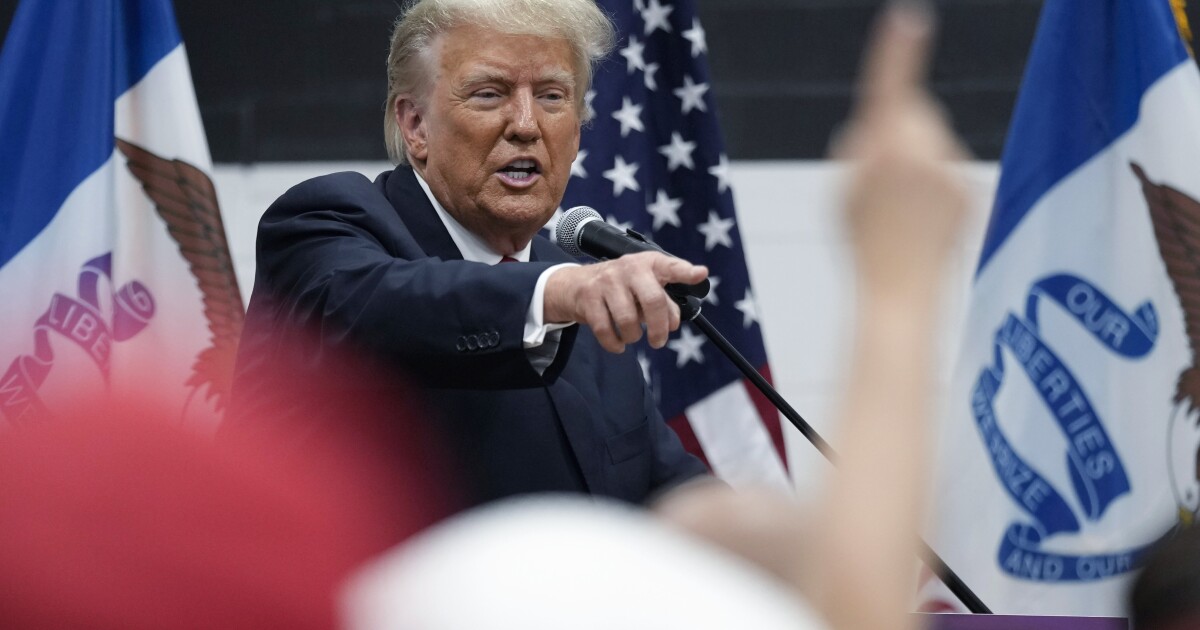

Former President Donald Trump made history when he became the first president to be federally indicted Thursday. His charges originated from the Espionage Act of 1917, which prohibits interference in the United States military.
Trump announced his indictment on Truth Social late Thursday, telling supporters that he was summoned to appear at a courthouse on Tuesday. The unsealed indictment showed the former president was indicted on 37 charges.
THE BUSINESSES AND PEOPLE HARMED BY THE RISE OF ESG
Numerous other people have been tried under the Act over the years. Here are a few of the most notable cases.
Eugene V. Debs
Though Trump made history as the first former president to be federally indicted, he did not make history as the first presidential candidate to do so. Debs, a socialist leader, was arrested after making a June 16 speech in 1918 urging his supporters to actively interfere with U.S. military recruitment in World War I, the exact conduct that the Espionage Act was enacted to combat. The four-time Socialist presidential candidate appealed his conviction on First Amendment grounds in what was to become a cause celebre.
In a unanimous Supreme Court decision, the court upheld Debs’ conviction in Debs v. United States.
Despite his imprisonment, however, Debs ran for a fifth time for president on the Socialist Party ticket from his prison cell. He won 3.5% of the vote, according to Smithsonian magazine.
Julius and Ethel Rosenberg
Perhaps the most famous use of the Espionage Act was the conviction of Julius and Ethel Rosenburg, who were convicted of leaking critical nuclear weapon designs to the Soviet Union, along with other advanced technology. The couple was arrested in 1951 and received the harshest punishment possible, the death penalty, under Section 2 of the Espionage Act, which prevents individuals from transmitting information about national defense to foreign powers.
In justifying the decision, Judge Irving Kaufman argued that aside from endangering national security, the Rosenburgs had caused the Korean War and were thus responsible for the deaths of all American soldiers in the conflict. In his grandiose closing statement, he accused the Rosenburgs of trying to destroy the U.S.
“In the light of the circumstances, I feel that I must pass such sentence upon the principals in this diabolical conspiracy to destroy a God-fearing nation, which will demonstrate with finality that this nation’s security must remain inviolate; that traffic in military secrets, whether promoted by slavish devotion to a foreign ideology or by a desire for monetary gains must cease,” Kaufman said in his closing statement.
Despite numerous calls for clemency from many public figures, including Pope Pius XII, the couple was executed via the electric chair on June 19, 1953.
Edward Snowden
The National Security Administration whistleblower ran afoul of the U.S. government in 2013 when he leaked top-secret information on U.S. surveillance programs and other state secrets. Along with theft, federal prosecutors charged him with “unauthorized communication of national defense information” and “willful communication of classified communications intelligence information to an unauthorized person.” The last two charges came under the Espionage Act, the Washington Post reported.
Unlike others on this list, Snowden was able to evade prosecution altogether by fleeing the country. He first stopped in Hong Kong, then he fled to Russia, where he lives today. Last year, he was granted Russian citizenship in a decree from Russian President Vladimir Putin.
Jack Teixeira
The most recent case before Trump on this list involves the 21-year-old airman 1st class in the Air National Guard. He was arrested in April after he leaked a number of highly classified military documents, many of which related to the War in Ukraine. The documents were leaked to an online chatroom on the social media app Discord. Investigators believed that he leaked classified documents from December 2022 to April of this year.
Members of the Discord group “Thug Shaker Central,” where the documents were shared, claimed that Teixeira wasn’t trying to be a whistleblower or serve a foreign adversary, but rather he only wanted to show off to his friends.
“This guy was a Christian, anti-war, just wanted to inform some of his friends about what’s going on,” said one acquaintance of Teixeira’s. “We have some people in our group who are in Ukraine. We like fighting games. We like war games.”
CLICK HERE FOR MORE FROM THE WASHINGTON EXAMINER
Teixeira was charged with unauthorized retention and transmission of national defense information and unauthorized removal and retention of classified documents or material under the Espionage Act. His lawyers argue that he never meant for the documents to be seen outside of his tight-knit Discord group, but the judge didn’t pay much credence to the argument.
“I find it a little incredible that the defendant could not foresee that possibility,” Magistrate Judge David Hennessy said.




